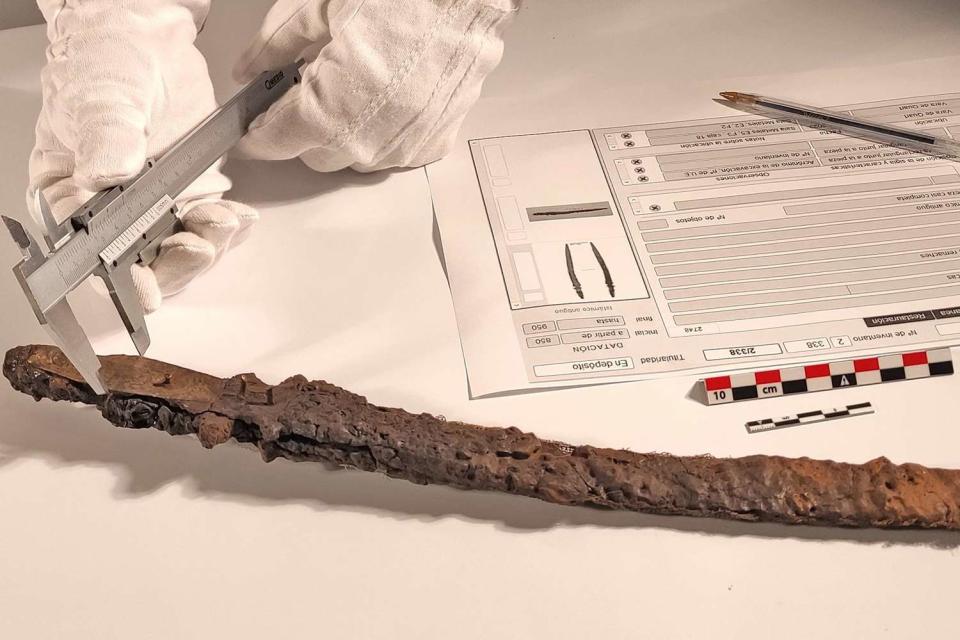Mysterious Ancient Weapon Uncovered in Spain 30 Years Ago Discovered to Be Over 1,000 Years Old
The curved-blade sword was first discovered during a 1994 archeological dig in Valencia

City Council of València
A 1,000-year-old weapon found sticking out of a grave in SpainAn artifact discovered 30 years ago in Spain has finally been identified — and researchers believe it to be over 1,000 years old.
In 1994, archeologists in Valencia, Spain discovered an ancient grave while excavating a home — and a mysterious sword-like object, dubbed "Excalibur" by the researchers for its resemblance to the legendary sword of King Arthur, was found sticking out of the gravesite.
However, it remained untouched for 30 years after archeologists could not conclude its origin. But earlier this year, the Spanish city's archaeology department made significant developments after it decided to review its old collections in honor of its 75th-anniversary celebrations, per the Miami Herald.
⚔️Una espada encontrada en 1994 ha sido catalogada como islámica del siglo X gracias a José Miguel Osuna, beneficiario de la beca de arqueología municipal de @CulturalVLC
Denominada Excálibur, es la primera arma de época islámica encontrada en #València
🔗https://t.co/0Kj4vFTew3 pic.twitter.com/YxRNzzypou— Ajuntament València (@AjuntamentVLC) April 22, 2024
The City Council of Valencia wrote in Spanish in an April 22 press release that the sword was found to be from the 10th century, the Islamic period of Spain's history.
Archeologist José Miguel Osuna, who led the research project on "Excalibur" earlier this year, found that the 18 inch-blade was from the Islamic period because of its hilt, decorated with bronze plates and notches for handling, per the press release. The sword's curved metal tip caused confusion among researchers, who thought it might have belonged to the Visigoths, but Osuna later disproved this idea.
Related: Fossils of Rare Mammal Relatives from 180 Million Years Ago Found in Utah
According to the archeologist, the ancient weapon might have belonged to a horseman in the Al-Andalus kingdom — an empire that controlled much of the Iberian peninsula from the early 700s until the early 11th century, according to Britannica — as the sword has no hand guard.
In a post on X (formerly Twitter), officials also confirmed that "Excalibur" is the first weapon from the Islamic period that has been found in Valencia.
Artifacts are rarely preserved as well as this one in Spain, the City Council noted in its press release, and the soil characteristics in the Valencia region make preservation even more difficult. The sword is a rare find, it added.
Related: Scientists Announce They’ve Discovered 240 Million-Year-Old 'Chinese Dragon' Fossil: ‘Very Strange’
Never miss a story — sign up for PEOPLE's free daily newsletter to stay up-to-date on the best of what PEOPLE has to offer, from celebrity news to compelling human interest stories.
City council cultural representative José Luis Moreno noted in the release that the sword was just one of many artifacts — from the Roman era to the late medieval period — being studied in the city's archeological collection for the department's 75th anniversary.
Related: 10 Newly Discovered Shipwrecks from 3,000 B.C. to WWII Reveal Ancient Artifacts Spanning Centuries
This isn't the only recent find from archeologists that dates back thousands of years ago — just last month, divers in the Aegean Sea discovered 10 shipwrecks dating as far back as 3,000 B.C. and extending to World War II that contained ancient artifacts from around the world.
Objects including drinking vessels, terra sigillata flasks, an amphora and a stone anchor from the Archaic period originating from Spain, Italy, Africa and Asia Minor were all found in the wreckage.
For more People news, make sure to sign up for our newsletter!
Read the original article on People.


